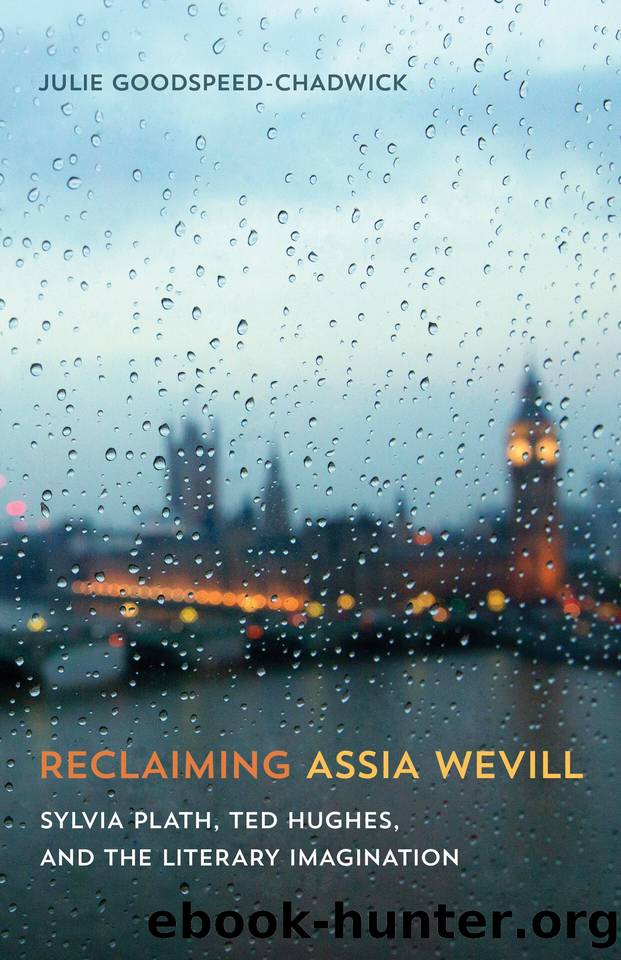Reclaiming Assia Wevill by Goodspeed-Chadwick Julie

Author:Goodspeed-Chadwick, Julie
Language: eng
Format: epub
Publisher: LSU Press
Published: 2019-10-09T00:00:00+00:00
ASSIAâS LETTERS, OTHER DOCUMENTS, AND CONTEXT: GENDER AND IDENTITY POLITICS
Assiaâs letters present a place for us to begin, with respect to analyzing and discussing artifacts related to her, because they give us access to her voice as she recorded it, unmediated or unredacted by others. Six letters from Assia to Hughes are archived, along with letters to other correspondents. Her letters depict her as a woman suffering for love. They also show her to be a complex and intelligent individual who was very self-critical, self-aware, and literary. What we do not find in Assiaâs letters is the oversexed demon or rival who was bent on destroying Plath or Hughes. We also do not see someone who is building herself up to be the victor. Instead, in most cases, she paints her love life as anything but glamorous and as anything but happy. She also addresses the power dynamics in her life, and we are able to evaluate her literary products and artistic contributions within the context of her life as a result of these letters.
In her letters, Assia exposes the gendered facets of her life while actively interrogating and problematizing her thoughts, her options, and her own life situations. Through a sample of her extant letters and diary entries, we discern her working over gendered issues and literary matters and analyzing her interpersonal experiences, especially her romantic relationship with Hughes. Assiaâs archived letters and selected journal entries permit insight into the woman who influenced Plath and Hughes, and more important, they humanize her. In her representations of herself, she does not resemble the barren demon-goddess she has been made out to be in Plathâs and Hughesâs poetry or in traditional scholarship, to the detriment of feminist research on Plath, Hughes, or Assia.
From here, I will discuss the gendered identity politics of Assiaâs life and, later on, her work. In a March 1965 letter, Assia highlights her maternal side, causing us to revise traditional representations that painted her otherwise. In three archived letters to Hughesâs close friend Lucas Myers, Assia confides her feelings concerning the birth of her daughter, Shura, as well as developments (or the lack thereof) in her relationship with Hughes. She asks solicitously about Myersâs writing and expresses her views about other literary people, clearly thinking he will find such descriptions interesting. In the March 1965 letter, Myers is addressed possessively in the salutation, subtly emphasizing the relationship between Hughes and Assia herself to Myers. Assia tells Myers that she has been ecstatic for the last ten days, due to the birth of her beloved daughter, and she describes the pretty baby, closing her descriptions by reiterating that she is very moved by Shura emotionally. This letter, in particular, counters the harshness of both Plath and Hughes and their characterization of Assia as an unnatural mother and, by association, a bad woman. We encounter Assia as someone who is sweetly maternal in her 29 November 1966 journal entry in her catalog of the close of what appears to
Download
This site does not store any files on its server. We only index and link to content provided by other sites. Please contact the content providers to delete copyright contents if any and email us, we'll remove relevant links or contents immediately.
The Power of Myth by Joseph Campbell & Bill Moyers(1068)
Half Moon Bay by Jonathan Kellerman & Jesse Kellerman(987)
A Social History of the Media by Peter Burke & Peter Burke(985)
Inseparable by Emma Donoghue(983)
The Nets of Modernism: Henry James, Virginia Woolf, James Joyce, and Sigmund Freud by Maud Ellmann(912)
The Spike by Mark Humphries;(811)
The Complete Correspondence 1928-1940 by Theodor W. Adorno & Walter Benjamin(788)
A Theory of Narrative Drawing by Simon Grennan(781)
Culture by Terry Eagleton(775)
Ideology by Eagleton Terry;(742)
World Philology by(719)
Farnsworth's Classical English Rhetoric by Ward Farnsworth(715)
Game of Thrones and Philosophy by William Irwin(712)
Bodies from the Library 3 by Tony Medawar(709)
High Albania by M. Edith Durham(704)
Adam Smith by Jonathan Conlin(693)
A Reader’s Companion to J. D. Salinger’s The Catcher in the Rye by Peter Beidler(688)
Comic Genius: Portraits of Funny People by(652)
Monkey King by Wu Cheng'en(652)
